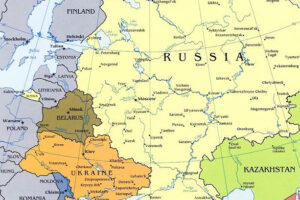U.S. Report Finds Trend Lines On Human Rights ‘Moving In Wrong Direction’

(Article text ©2021 RFE/RL, Inc., Radio Free Europe/Radio Liberty – rferl.org – WASHINGTON, March 31, 2021 – article text also appeared at rferl.org/a/us-human-rights-report-2020/31178835.html)
A U.S. report on human rights around the world highlights a deteriorating picture in many countries, including Belarus, where the report outlines the use of “brute force” against peaceful pro-democracy protesters, and Russia, where opposition politician Aleksei Navalny was targeted.
U.S. Secretary of State Antony Blinken told a briefing on March 30 that in those countries and others, “trend lines on human rights continue to move in the wrong direction.”
Blinken spoke as the human rights report outlining the situation last year in nearly 200 countries worldwide was released. The State Department is required to write the report annually and send it to Congress.
“Too many people continued to suffer under brutal conditions in 2020,” Blinken said in an introduction to the report. He said some governments had used the coronavirus pandemic as a “pretext to restrict rights and consolidate authoritarian rule.”
The report on Russia highlighted the nerve-agent poisoning of Navalny, who was imprisoned earlier this year upon returning to Russia from months of treatment in Germany. The report said “credible reports” indicated officers from Russia’s Federal Security Service (FSB) poisoned Navalny last August.
It also mentions “credible” reports by nongovernmental organizations and independent media outlets of a campaign of violence, including torture and extrajudicial killings, against LGBT people in Russia’s Chechnya region, and reports that the government or its proxies committed or attempted to commit extrajudicial killings of its opponents in other countries.
The report defined Belarus as “an authoritarian state” and catalogued a long list of “significant human rights issues,” including arbitrary killings by security forces, torture in detention facilities, arbitrary arrests, serious problems with the independence of the judiciary, and restrictions on free expression and the press.
“Authorities at all levels generally operated with impunity and always failed to take steps to prosecute or punish officials in the government or security forces who committed human rights abuses,” the report on Belarus said.
The report also spotlighted threats to freedom of expression and a free press in Kyrgyzstan, where a joint investigative series in 2019 by RFE/RL’s Kyrgyz Service, Kloop, and the Organized Crime and Corruption Reporting Project (OCCRP) exposed hundreds of millions of dollars in corruption in that Central Asian state.
In a section on respect for civil liberties, including freedom of the press, the State Department noted threats to journalists involved in that report, which implicated former deputy customs head Raimbek Matraimov.
It said RFE/RL had relocated some of its journalists “amid serious threats to their lives and families, for fear of political reprisal,” and it cited a video purporting to show text messages from Matraimov offering a “dead-or-alive” bounty on the return of one of the journalists behind that story.
A Bishkek court in February ordered pretrial custody for Matraimov in connection with corruption charges after hundreds of Kyrgyz protested a previous ruling mitigating a sentence after a guilty plea to no jail time and fines of just a few thousand dollars.
The report is especially critical of China, using assertive language to describe the Chinese government’s treatment of Uyghurs and other mostly Muslim ethnic minority groups in Xinjiang Province as “genocide and crimes against humanity.”
The report described a litany of crimes committed by the state against those groups in Xinjiang, including arbitrary imprisonment, forced sterilizations and other coerced birth-control measures, torture, forced labor, and “draconian” restrictions on basic freedoms.
It said in addition to the estimated 1 million Uyghurs and other minority groups in extrajudicial internment camps, there were an additional 2 million subjected to daytime-only “’reeducation’ training.”
Blinken also said that the State Department plans to bring back topics of reproductive health in the country reports. An addendum will be released later this year that will cover the issues, including information about maternal mortality and discrimination against women in accessing sexual and reproductive health.
The topics were removed from the report by the Trump administration.
With reporting by AFP and Reuters
